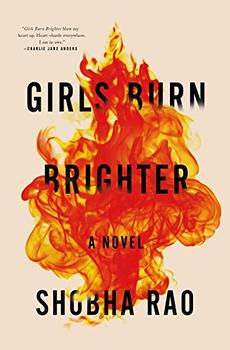Summary | Excerpt | Reading Guide | Discuss | Reviews | Beyond the Book | Readalikes | Genres & Themes | Author Bio

Critics' Opinion:
Readers' Opinion:
First Published:
Mar 2018, 320 pages
Paperback:
Mar 2019, 400 pages
 Book Reviewed by:
Book Reviewed by:
Grace Symes
Buy This Book
But sunlight and moonlight weren't Poornima's only considerations. The other one, the main one, was that her mother was ill. Cancer, as far as the doctor at the American hospital in Tenali could tell. Medicine was expensive, and the doctor put her on a diet of fruits and nuts—also expensive. Her father, who made the homespun cotton saris that their region of Guntur district was famous for, could barely keep his wife and five children fed on government-rationed rice and lentils, let alone the luxury of fruits and nuts. But Poornima didn't mind. She relished—no, not just relished, but delighted, actually savored—the food she was able to buy for her mother every day: two bananas, a tiny apple, and a handful of cashews. By savoring, it was not that she actually ate any of the fruit or nuts. Never did she take even a single bite, though her mother did, once, coax her into accepting a cashew, which, when her mother turned away for an instant, Poornima placed back on the pile. No, by savoring, what Poornima did was watch her mother slowly eating the banana, even chewing such a soft thing exhausting her, but Poornima watched her with such conviction, such hope, that she thought she could actually see her mother getting stronger. As if strength were a seed. And all she had to do was add her two rupees' worth of food and watch it grow.
It got so that Poornima almost made as much as her father. Here is what she did: she'd get loops of raw thread, undivided and in thick bundles, and by using the charkha, her job was to spin the thread so that it separated, and as it did, wound around a metal canister. She once looked at the thread wound around the canister and thought it looked just like a tiny wooden barrel, nearly the size of her littlest brother's head. This thread would then eventually end up on the loom where her father made the saris. It was treated further before it got to the loom, but Poornima always thought she could spot the lengths of thread that she had spun. The canisters that she had wound it around. Anyone would've laughed if she'd told them this—they all look the same, they'd have said—but that wasn't true. Her hands had felt the canister, known the places it was dented, the contours of its body, the patterns of its rust. She had held them, and it seemed to her that anything a person has held is a thing they never really let go. Like the small wind-up clock her teacher had given her when she'd left school. It had a round blue face, four little legs, and two bells that chimed every hour. When her teacher, an old and embittered Catholic nun, had given it to her, she'd said, "I suppose they'll get you married now. With a child a year for the next ten. Hold this. Hold on to this. You won't know what I mean now, but you might one day." Then she'd wound up the clock and let it chime. "That sound," she'd said. "Remember: that sound is yours. No one else's but yours." Poornima had no idea what the old nun was talking about, but she thought the chiming of the clock was the most exquisite sound she'd ever heard.
She began carrying the clock everywhere. She put it next to her charkha while she worked. She placed it beside her plate when she ate. She put it by her mat when she slept. Until one day, just like that, the clock stopped chiming, and her father exclaimed, "Finally. I thought that thing would never stop."
A few months after the clock stopped chiming Poornima's mother died. Poornima had just turned sixteen—she was the eldest of the five children—and watching her mother die was like watching a fine blue morning turn to gray. What she missed most about her mother was her voice. It was soft and mellifluous and warm against the rat-chewed walls of the small hut. It pleased Poornima that such a lovely voice should reach for her, that it should cut through the long hours, when all those hours really amounted to were two bananas, an apple, and a handful of cashews. Her mother's was a voice that could make even those few things seem like the ransom of kings. And now Poornima had lost both her mother and the clock.
Excerpted from Girls Burn Brighter by Shobha Rao. Copyright © 2018 by Shobha Rao. Excerpted by permission of Flatiron Books. All rights reserved. No part of this excerpt may be reproduced or reprinted without permission in writing from the publisher.





The House on Biscayne Bay
by Chanel Cleeton
As death stalks a gothic mansion in Miami, the lives of two women intertwine as the past and present collide.

The Flower Sisters
by Michelle Collins Anderson
From the new Fannie Flagg of the Ozarks, a richly-woven story of family, forgiveness, and reinvention.

The Funeral Cryer by Wenyan Lu
Debut novelist Wenyan Lu brings us this witty yet profound story about one woman's midlife reawakening in contemporary rural China.
Your guide toexceptional books
BookBrowse seeks out and recommends the best in contemporary fiction and nonfiction—books that not only engage and entertain but also deepen our understanding of ourselves and the world around us.